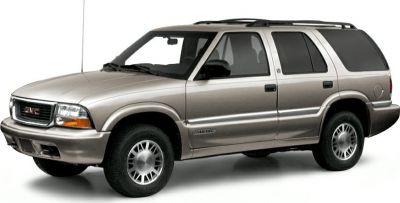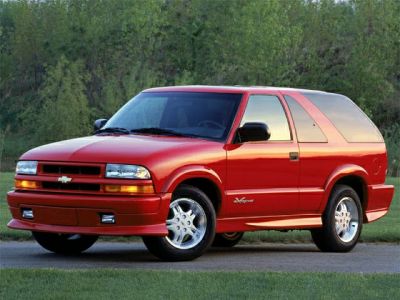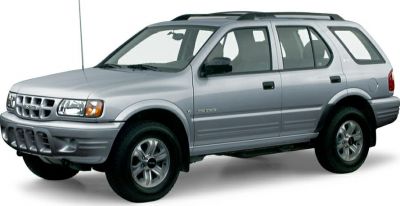 1993 Honda Passport I Dimensions, Size & Specs
1993 Honda Passport I Dimensions, Size & SpecsMeasurements of the 1993 Honda Passport I, engineered for optimal performance and comfort
| Dimensions | |
|---|---|
| Length: | 4480 mm176.4 in14.7 ft |
| Width: | 1690 mm66.5 in5.5 ft |
| Height: | 1660 mm65.4 in5.4 ft |
| Weight Specifications | |
| Curb Weight: | 1609-1835 kg3547-4045 lbs |
| Tire Specifications | |
| Tire Size: |
|
The Honda Passport I, produced from 1993 to 1997, marked Honda's entry into the SUV market, combining reliability with practical dimensions suitable for family and off-road use. This first-generation Passport measures 4480 mm (176.4 inches) in length, 1690 mm (66.5 inches) in width, and 1660 mm (65.4 inches) in height, positioning it as a compact to mid-size SUV in its era. Its curb weight ranges between 1609 and 1835 kg (3546 to 4047 lbs), reflecting its sturdy build and capability. Equipped with 225/75 R15 tires, the Passport I provided a balanced ride with decent ground clearance for light off-roading. As a versatile SUV of the early 1990s, it offered a practical footprint for both urban driving and outdoor adventures, appealing to drivers seeking a rugged yet manageable vehicle size. The Passport I’s dimensions make it comparable to other SUVs in the compact class of the time, emphasizing efficient use of space and a comfortable ride height without excessive bulk.
Discover the standout features that make the 1993 Honda Passport I a leader in its class
Have a question? Please check our knowledgebase first.
The 1993-1997 Honda Passport I measures 4480 mm (176.4 inches) in length, 1690 mm (66.5 inches) in width, and 1660 mm (65.4 inches) in height. These dimensions place it within the mid-size SUV category for the era, providing a balance of exterior footprint suitable for suburban and light off-road driving scenarios. Its length and width allow for reasonable handling and maneuverability, while the height offers a commanding driving position.
The Honda Passport I has a curb weight ranging from 1609 kg to 1835 kg (approximately 3546 lbs to 4046 lbs). This weight range is typical for SUVs of its class and era, affecting fuel efficiency, handling, and acceleration. Lower weights help improve agility and fuel economy, while the heavier end of the range may correspond to models with additional equipment or features. The mid-weight range balances durability and performance in an SUV designed for light off-road and city use.
A standard residential garage typically measures about 2440 mm (8 feet) in width and 4877 mm (16 feet) in length. With the Passport's width at 1690 mm (66.5 inches or about 5.57 feet) and length at 4480 mm (176.4 inches or about 14.7 feet), the vehicle fits comfortably within a standard single-car garage. Its height of 1660 mm (65.4 inches) is also well within typical garage door heights, making garage storage convenient and feasible for most homes.
The Honda Passport I's width of 1690 mm (66.5 inches) is fairly narrow compared to many SUVs, which often exceed widths of 1800 mm. This narrower stance enhances maneuverability in urban environments, allowing easier navigation through tight city streets and parking lots. It also facilitates parking in standard sized spots without difficulty. The compact width is an advantage for drivers seeking SUV capabilities without the bulk of larger vehicles.
The Honda Passport I is equipped with tires sized 225/75 R15. These tires feature a relatively tall sidewall (75% of the tire's width), contributing to a smoother ride by absorbing road imperfections and providing some cushioning. The 15-inch rim size was common during the period and suits the SUV's balance between on-road comfort and light off-road capability. These tires enhance traction on unpaved roads and offer a stable footprint for varied terrain.
With an exterior height of 1660 mm (65.4 inches), the Honda Passport I offers a relatively tall body profile, typical of SUVs designed in the early 1990s. This height contributes positively to interior headroom, providing comfortable seating for both front and rear passengers. Additionally, the elevated stature creates a commanding on-road presence and improved visibility for the driver, traits valued in SUVs for both safety and perception of control.
The Honda Passport I was actually Honda's first SUV offering in the United States and did not have a domestic predecessor. Instead, it was a badge-engineered version of the Isuzu Rodeo designed to enter the growing SUV market. This collaboration allowed Honda to quickly offer an SUV with reliable all-terrain capability. Differences include Honda-specific badging and interiors, but mechanical components and chassis were shared, providing consumers with a new choice in the compact SUV segment without Honda's prior direct predecessor.
During the early 1990s, mid-size SUVs like the Ford Explorer, Toyota 4Runner, and Jeep Cherokee had dimensions and weights somewhat similar but often larger than the Passport I. The Passport’s length of 4480 mm (176.4 inches) was slightly shorter than some rivals, offering easier handling in tight spaces. Its curb weight between 1609 and 1835 kg positioned it as competitive for the class, balancing ruggedness with manageable fuel economy. The Passport was known for its comfortable ride and Honda's reputation for reliability, setting it apart in the segment.
The Honda Passport I typically seats five passengers with two front bucket seats and a rear bench seat. The interior cabin space aligns with its mid-size SUV dimensions, offering reasonable headroom and legroom for front and rear occupants. Cargo capacity is sufficient for typical family or outdoor activities, with a rear cargo area that can be expanded by folding down the rear seats, facilitating versatile storage options. This configuration supports both daily commuting and recreational use.
The 1993-1997 Honda Passport I was powered primarily by a V6 engine sourced from Isuzu, typically a 3.2-liter or 3.5-liter V6, paired with either a 5-speed manual or 4-speed automatic transmission. The driving characteristics highlighted durability, decent power output for its class, and competent off-road performance due to available four-wheel-drive configurations. The Passport I was praised for its Honda-tuned suspension offering a smoother ride compared to some competitors, balancing on-road comfort and light off-road capability.
Discover similar sized cars.

| Production: | 1994-2001 |
|---|---|
| Model Year: | 1995 |
| Length: | 4503 mm177.3 in |
| Width: | 1722 mm67.8 in |
| Height: | 1648 mm64.9 in |

| Production: | 1998-2005 |
|---|---|
| Model Year: | 1999 |
| Length: | 4491 mm176.8 in |
| Width: | 1722 mm67.8 in |
| Height: | 1638-1648 mm64.5-64.9 in |

| Production: | 1994-1998 |
|---|---|
| Model Year: | 1995 |
| Length: | 4420-4602 mm174.0-181.2 in |
| Width: | 1661-1772 mm65.4-69.8 in |
| Height: | 1593-1702 mm62.7-67.0 in |

| Production: | 1989-2000 |
|---|---|
| Model Year: | 1990 |
| Length: | 4480 mm176.4 in |
| Width: | 1690 mm66.5 in |
| Height: | 1660 mm65.4 in |
